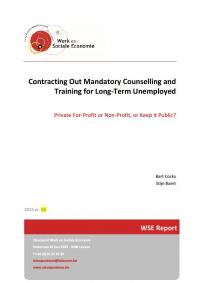Gedaan met laden. U bevindt zich op: Contracting Out Mandatory Counselling and Training for Long-Term Unemployed. Private For-Profit or Non-Profit, or Keep it Public?
Contracting Out Mandatory Counselling and Training for Long-Term Unemployed. Private For-Profit or Non-Profit, or Keep it Public?
Traditionally, economic theory justified public provision of goods and services in case of market failure. To account for monopoly power, externalities and other market failures, this has led to the nationalisation of private firms, such as in the sectors of insurance, mining and telecommunications. However, since the early 1980s, the large budget deficits in many OECD countries and the fall of Communism have led to an end of this paradigm. Public production is increasingly privatised, and a theory of government failures has subsequently begun to develop. According to this theory, the conditions under which state provision is superior to private provision are highly limited (Schleifer 1998). It is in this context that governments increasingly attempted to transfer methods of private business management to the public sector and started to outsource public services through competitive tenders to the private sector (Sørensen 2014). Since the late 1990s, this privatisation effort also led to a growing tendency to outsource public employment services for job seekers (Finn 2011). In this study, our key objectives are to discover whether (i) outsourcing of these services to the private sector enhances performance relative to in-house public provision, and (ii) whether private non-profit organisations (NPOs) are more efficient in this delivery than private for-profit organisations (FPOs).

Lees de publicatie
- Uitgever
- Publicatiedatum
- Oktober 2015
- Publicatietype
- Onderzoeksrapport
- Thema's
- Toegang tot de arbeidsmarkt , Arbeidsmarkt
- Auteur(s)
- Steunpunt Werk en Sociale Economie, Sherpa UGent, Stijn Baert, Bart Cockx
- Reeks
- WSE-onderzoeksrapporten